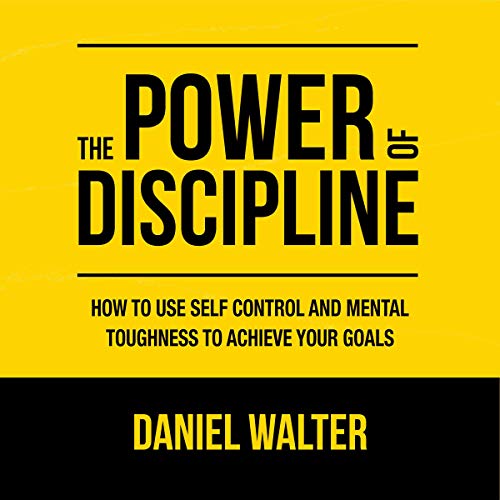
‘The Power of Self-Discipline’ is a great resource that teaches us how to overcome challenges and achieve our goals
Shuhban Ali Siyal
In today’s fast-moving world, having self-discipline has become really important for achieving success in our personal and professional lives. It means being able to control ourselves and stay focused, even when there are lots of things trying to distract us. Daniel Walter’s book, “The Power of Self-Discipline,” is a great resource that teaches us how to do this. It shows us how to overcome challenges and achieve our goals by staying determined and not abandon. The book explores how to use self-control and mental thoughtfulness to achieve goals, improve lives, and become better versions of ourselves.

The book begins by explaining what self-discipline means. It’s all about having control over our actions, thoughts, and emotions to make positive choices. It teaches us how to resist temptations and distractions that might hinder our progress. Throughout the book, Daniel Walter shares practical tips and techniques to develop self-discipline. He emphasizes the importance of setting clear goals and creating a plan to achieve them. By building healthy habits and routines, we can gradually strengthen our self-discipline.
The book also emphasizes the importance of a positive mindset. Walter explains that we should believe in ourselves and our ability to be disciplined. He encourages us to replace negative thoughts with positive ones and to be kind to ourselves if we make mistakes. Self-discipline is a journey, and we should be patient with ourselves.
A lack of self-discipline contributes to low self-esteem. There are many reasons people suffer from low self-esteem – one of them is that they are not where they need to be in life. People may set goals all the time, especially at the beginning of the year, but by the second or third month, they have lapsed, back into old habits and their goals are forgotten. Most people fail in life because they don’t do what is yearned for success.
In the book, author shows, how self-discipline can benefit different areas of life. For example, being disciplined can help us succeed in school or work. It can also improve our health if we make disciplined choices like eating nutritious food and getting enough sleep. The book gives examples of successful people who achieved great things through self-discipline.
Throughout the book, Walter shares a set of rules, principles, laws, and formulas that enable people to exercise self-control, and achieve their goals without getting caught up in procrastination.
Breakdown goal into small task
The author starts by telling that setting clear goals is important. When we know what we want to achieve, we can make a plan and work towards it. He suggests writing down your goals and breaking them into smaller tasks. In this way, you can see progress and stay motivated. One rule mentioned in the book is about creating healthy habits. The author says that doing something regularly can become a habit. For example, if we want to exercise, we can start with small steps like walking for 15 minutes each day. Over time, it will become a habit, and we won’t have to force ourselves to do it.
Resisting temptations and distractions
The book talks about how we often get distracted by things like social media, TV shows, or unhealthy food. The author suggests practicing self-control by saying “no” to these distractions. He advises us to focus on our goals and remember the benefits of staying disciplined.
Dunning-Kruger effect in self-discipline
It is about people not realizing how much self-control they really have. Some people think they have more self-discipline than they do, which can lead to disappointment when they can’t stick to their goals. Others don’t believe in themselves enough and underestimate their ability to stay focused and do well. Understanding this effect helps us know ourselves better, set goals we can actually achieve, learn from others, and keep getting better. When we know our true self-discipline, we can make progress and grow as individuals. According to Daniel Walter the Dunning-Kruger effect in self-discipline requires a commitment to continuous self-improvement, seeking feedback, learning from others, and engaging in self-reflection. By challenging inaccurate perceptions and developing a more accurate understanding of their abilities, individuals can enhance their self-discipline skills and achieve greater personal growth and success.
The “40% rule” and the “10X rule”
These are principles related to building better habits and self-discipline. The 40% rule; suggests that when you think you have reached your physical, mental, or emotional limit, you have actually only tapped into about 40% of your potential. It implies that we often underestimate our capabilities and can push ourselves further than we initially believe. By embracing the 40% rule, you can develop the mindset to push through challenges, discomfort, and perceived limits, ultimately building greater self-discipline. While 10X Rule: rule emphasizes taking massive action and putting in ten times the effort and dedication compared to what you initially think is necessary. It encourages setting higher goals and working with a greater intensity to achieve them. Author suggest that by adopting the 10X rule, you challenge yourself to go above and beyond, pushing your limits and building stronger habits of discipline and perseverance.
Parkinson’s Law
It is an important concept in self-discipline. It states that work expands to fill the time available for its completion. This means that if you give yourself more time than necessary for a task, you’re likely to take that entire time to complete it. To leverage Parkinson’s Law for self-discipline, set specific deadlines, practice time-boxing, break tasks into smaller chunks, use self-imposed deadlines, and prioritize and focus on high-impact activities. Remember to maintain a balance and flexibility in applying this principle
The Seventy Percentage Rule
This means focusing on consistent effort and progress instead of striving for perfection. It suggests aiming to operate at about 70% of your capacity rather than pushing yourself to the absolute limit. By doing so, you avoid burnout and maintain a sustainable pace. The rule emphasizes small, gradual improvements over time and developing positive habits. It’s important to be flexible and adjust based on your circumstances. Overall, the rule promotes steady progress and personal growth without getting caught up in the pursuit of perfection.
The Pareto Principle and Sturgeon’s Law

The Pareto Principle also known as the 80/20 rule, says that roughly 80% of the results come from 20% of the effort. In simple terms, it means that a small portion of what we do leads to the majority of our outcomes. For example, in studying, focusing on the most important 20% of the material can yield 80% of the knowledge you need. The key is to identify and prioritize the tasks or actions that will have the biggest impact, so you can make the most efficient use of your time and resources. Whereas Sturgeon’s Law states that 90% of everything is mediocre or of low quality. In simpler terms, it means that a lot of things aren’t that great. Whether it is books, movies, or ideas, there tends to be a large portion that is just average or below average. However, the remaining 10% represents the valuable, high-quality stuff. So, the idea is to sift through the mediocre and focus on finding the best 10% that truly stands out. This principle reminds us to be discerning and selective in our choices, seeking out the exceptional and not settling for mediocrity. So in short Daniel Walter defines, Pareto Principle highlights that a small portion of effort leads to the majority of results, while Sturgeon’s Law reminds us that much of what’s out there is average, but there’s a valuable minority that is exceptional.
In sum up, life is a reflection of the decisions you have made and if you want a better future, it’s essential that you start making better decisions. It is possible for you to have the life you desire, but it starts with taking responsibility for the state of your life at this present moment. Whether it’s your finances, lifestyle, relationships, or your mindset, it is up to you to make the required changes to improve. The following quote fully embodies the point I am making:
“You must take personal responsibility. You cannot change the circumstances, the seasons or the wind, but you can change yourself.” Jim Rohn
Self-discipline is a lifestyle. It’s not something you put to use embedded in your character.
____________
Shuhban Ali Siyal, studies in language and literature at Shaheed Benazir Bhutto University, Shaheed, Benazirabad (Nawabshah) Sindh